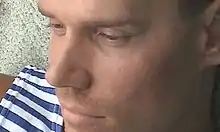Yuri Rydkin
Yuri Anatolyevich Rydkin (Russian: Ю́рий Анато́льевич Ры́дкин [ˈjʉrʲɪj ɐnɐˈtolʲjɪvʲɪtɕ ˈrytkʲɪn]; born 8 April 1979) is a Russian and Belarusian poet, a bot poetry[1][2] researcher.
Yuri Rydkin | |
|---|---|
 | |
| Born | Yuri Anatolevich Rydkin, 8 April 1979, Gomel, Byelorussian Soviet Socialist Republic, Soviet Union |
| Occupation | poet, fotocollage maker, literary critic, translator |
| Language | russian, belarusian |
| Citizenship | Belarus |
| Alma mater | Francisk Skorina Gomel State University |
| Genre | poetry, prose, fotocollage |
| Literary movement | post-postmodernism, eclecticism, new media art, futures studies |
Biography
The author studied at school No.3, Gomel (1986–1996).
He graduated from the Belarusian department of the Linguistic Faculty of Francisk Skorina Gomel State University in 2004.
6 October 1998 Yuri Rydkin attempted to commit a suicide jumping from a railway bridge in Gomel, as a result he got injured and disabled.[3][4]
Work
Rydkin explores the genre of conversation with bots in the most scrupulous way.[5][6][7] His works are screenshots of art-dialogues with virtual interlocutors, including Alice. In a literary critic Galina Rymbu's opinion, his «Bot Conversation» is written in the genre of found poetry.[8]
The poet has had a artistic dialogue with COVID-19 on Facebook. The screenshots of his fb-posts are published under the title of «COVID-POETRY» in a literary almanac.[9]
Rydkin is the founder of cyberzaum[5][10] and hyperlink poetry,[11][12][13][14][5][15] the concept of which was expressed in his manifestation.[16]
The author's stanza lyrics have a mark of futurology.[15]
Rydkin has made a few photo collages which attracted the attention of a photo artist Василий Ломакин and a art critic Теймур Даими.[17]
Rydkin is the author of literary critical articles on the prose of Margarita Meklina, Вадим Месяц, the poetry of Мария Степанова, Алла Горбунова, Ирина Котова, Лида Юсупова, Виктор Лисин and others.
The author has translated the works[18] by Daniil Kharms, Eduard Limonov and a chapter "Ultima Thule"[19] from the last unfinished Russian novel by Vladimir Nabokov into Belarusian.
His works have been published in such paper and electronic editions as Novy Mir, Znamya, Волга, Цирк «Олимп», Топос, Сетевая словесность, Homo Legens, Полутона, Ф-письмо, Лиterraтура, Журнальный зал,[20] Post(non)fiction, on the website of the publishing house Новое литературное обозрение[21] and in other journals.
Yuri Rydkin has been widely quoted by his contemporaries[22][23][24][25][26] and his works have attacted much attention of literary critics.[1][15][5][11][12][6][27][28][29][30][31] According to their opinion, his works of art are close to the works by Fyodor Svarovsky,[15] Dmitri Prigov[5] and Lev Rubinstein.[5]
References
- Malinovskaya M. "Man and Death". Volga. Retrieved 30 May 2020.
- Oborin L. "The best on the literary Internet". Gorky. Retrieved 30 May 2020.
- "The interview". Takie dela. Retrieved 30 May 2020.
- "Fb posts compilation by Yuri Rydkin. Anti-anniversary (the 20th anniversary of my death). 06. 10. 2018". Sygma. Retrieved 30 May 2020.
- Konakov A. "Russian poetry in the times of bot-to-bot communication". Colta. Retrieved 30 May 2020.
- Korkunov V. "Discussuon. New literary generation: does it really exist?". Znamya. Retrieved 30 May 2020.
- Oborin L. "What literary movements have appeared in the 21th century? Making a list for the nearest future". Yandex. Retrieved 30 May 2020.
- Rymbu G. "Eight poetic online publications (March, 2020)". Year of Literature. Retrieved 30 May 2020.
- Rydkin Y. "COVID-POETRY". Articulyatsia. Retrieved 30 May 2020.
- Rydkin Y. "Cyberzaum". Polutona. Retrieved 9 January 2021.
- Abrosimova C. "Modern hypertextual poetry (aspects of interaction of authentic texts and internet media)". Scientific dialogue No.8, 2020. Retrieved 4 January 2021.
- Abrosimova C. "Typology of intermedial relationships in a modern poetical discourse (a systematic review)" (PDF). Linguistic sciences, Theory and practice matters. Volume 13. Issue 7. p.122, 2020. Retrieved 4 January 2021.
- Rits E. "Review on hyperlink poetry". Polutona. Retrieved 30 May 2020.
- Rydkin Y. "Getting out of order: Other sweet, or Poetical botoholism". Olymp Circus. Retrieved 30 May 2020.
- Famitsky A. "Review on the poem "Soft"". Topos. Retrieved 30 May 2020.
- Rydkin Y. "Hyperlink poetry manifestation". Sygma. Retrieved 30 May 2020.
- Lomakin V., Daimi T., Seifert E. "Reviews on Yuri Rydkin's photo collages". Sygma. Retrieved 30 May 2020.
- "Kharms D. Obstacle, Limonov E. Ship under the Red Flag / Translated by Yuri Rydkin". Textura. Retrieved 30 May 2020.
- "A chapter from the last unfinished Russian novel by Vladimir Nabokov / Translated by Yuri Rydkin". Textura. Retrieved 30 May 2020.
- Republishing
- Republishing
- Russian State University for the Humanities. Series «Intelligentsia and modern life». Edition XX. Moscow, 2019. p. 65. №19-011-20054.
- Khrushcheva N. Metamodern in music and around it. М.: Ripol-classic, 2020. p. 150. ISBN 978-5-386-13540-9.
- Oborin L. "Digest of the most important materials in the book Internet". Gorky. Retrieved 30 May 2020.
- Davydov D. "Literary review". Literratura. Retrieved 30 May 2020.
- Krichevsky P. "An escape from a living fiber of the language". Articulyatsia. Retrieved 4 January 2021.
- Podlubnova J. "Review on the cyberpoem "Bot Being"". Kastopravda. Retrieved 30 May 2020.
- Bonch-Osmolovskaya T. "Review on "Bot Conversation"". Articulyatsia. Retrieved 30 May 2020.
- Seifert E. "Review on the story "Repressed Knock"". Polutona. Retrieved 30 May 2020.
- Podlubnova J. "Literature 2020. Literary results of the year". Colta. Retrieved 4 January 2021.
- Podlubnova J. "Triumph of Trauma". Articulyatsia. Retrieved 30 May 2020.